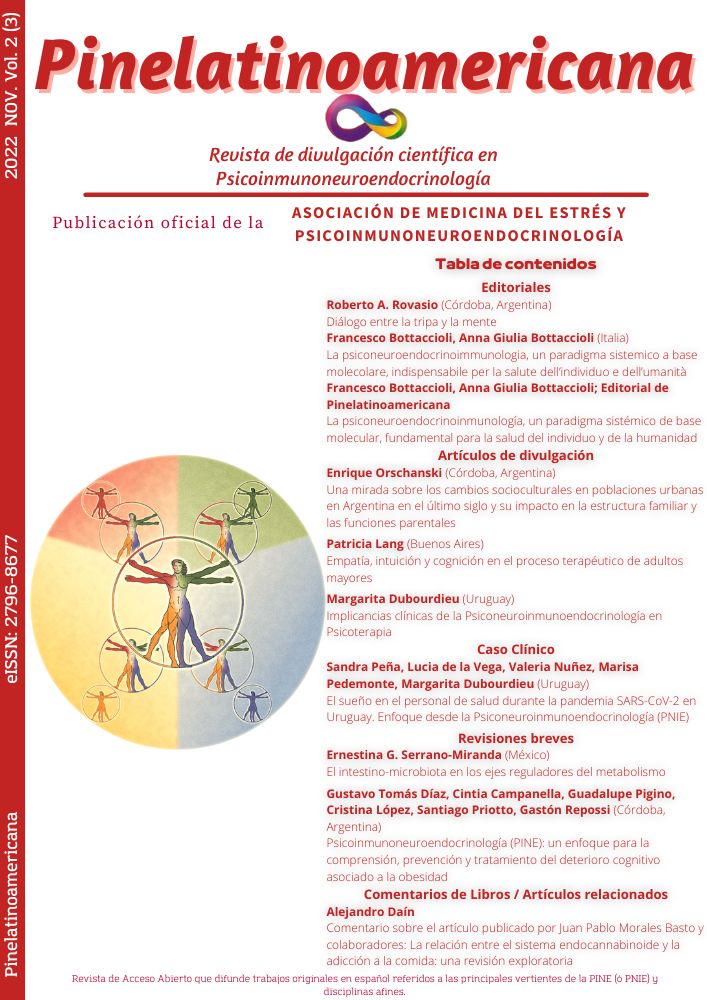Abstract
Psychoneuroimmune endocrinology (PNIE) has revealed the intermodulations of the psychological, nervous, endocrine and immune systems caused by stimuli from the internal and external environment and this prompts changes in the approach of clinical practice. It is necessary in the therapeutic strategy to consider interacting factors from the different dimensions of the person which are present in health and disease processes, as well as hypersensitized circuits by psychophysical experiences lived throughout life.
The diagnostic evaluation through Metaplasticity (Abraham, 1996), which arises from this incident multifactoriality in the etiology of the alterations, as well as from the convergence of the history of the individual, his present circumstances and expectations, are facts that will condition the processing of the following stimuli, including responses to both drugs and psychotherapy. This article is of interest to PNIE psychotherapists, as well as to professionals from other areas to go deep into the bases of the therapeutic strategy of Integrative Psychotherapy PNIE (PI, PNIE), the framework of the actions of the Latin American Federation PNIE (FLAPNIE) and thus favor transdisciplinary work.
References
Abraham, W. C. (1996). Activity-dependent regulation of synaptic plasticity (metaplasticity) in the hippocampus. En: N. Kato (Ed.) The hippocampus: functions and clinical relevance. (pp. 15–26). Elsevier.
Ader, R. (2000). On the development of psychoneuroimmunology. European journal of pharmacology, 405(1-3), 167–176. https://doi.org/10.1016/s0014-2999(00)00550-1.
Ader, R., Felten, D. L., Cohen N. (1991) Psychoneuroimmunology. (2ª Ed.). Academic Press.
Algazi, I. y Dubourdieu, M. (2002). Motivación y aalud para adultos mayores. Gráfica Digital.
American Psychiatric Association (1995). Introducción. En: Manual Diagnóstico y Estadístico de los Trastornos Mentales DSM-IV, (4a Ed.). Masson.
Bottaccioli, A. G., Bologna, M., y Bottaccioli, F. (2022). Psychic Life-Biological Molecule Bidirectional Relationship: Pathways, Mechanisms, and Consequences for Medical and Psychological Sciences-A Narrative Review. International journal of molecular sciences, 23(7), 3932. https://doi.org/10.3390/ijms23073932.
Brenlla, M. E., Diuk, L. W. y Maristany, M. P. (1992). Evaluación de la Personalidad: aportes del MMPI-2. Psicoteca Editorial.
Dubourdieu, M. (2008). Psicoterapia Integrativa PNIE. Integración cuerpo-mente-entorno. PsicolibrosWaslala.
Dubourdieu, M. (2011). Fascículo sobre Medicina y Psicoterapia Integrativa PNIE. Postgrado Integración en salud PNIE. Modelo de Abordaje terapéutico en el área médica y en el área psicológica. Universidad Católica del Uruguay.
Dubourdieu, M. (2017). Psicoterapia Integrativa PNIE. Integración cuerpo-mente-entorno (4ta Ed.). PsicolibrosWaslala.
Dubourdieu, M. y Nasi, L. (2017). Cáncer y Psiconeuroinmunología. Clínica Integrativa en Oncología. Editorial Nativa.
Kandel E. R. (2007). Psiquiatría psicoanálisis y la nueva biología de la mente. Ars Médica.
López Mato, A. (2008). Psiconeuroinmunoendocrinología. Los últimos serán los primeros. Editorial Sciens.
McEwen B. S. (1999). Stress and hippocampal plasticity. Annual review of neuroscience, 22, 105–122. https://doi.org/10.1146/annurev.neuro.22.1.105
Morin, E. (1994). Introducción al pensamiento complejo. Gedisa Editorial.
Selye, H. (1976). The stress of life. McGraw-Hill
Solomon, G. F. y Moss R. H. (1964). Emotions, immunity, and disease; a speculative theoretical integration. Archives of general psychiatry, 11, 657–674. https://doi.org/10.1001/archpsyc.1964.01720300087011.
Von Bernhardi, R., Bernhardi, L. E., y Eugenín, J. (2017). What Is Neural Plasticity? Advances in experimental medicine and biology, 1015, 1–15. https://doi.org/10.1007/978-3-319-62817-2_1.
Von Bertalanffy L., Wieinberg, G. M. Klir, G. J. y Ashby W. R. (1987). Tendencias en la teoría general de sistemas. Alianza Editorial.
Young, J. Y., Klosko, J. S. y Weishaar, M. E. (2003). Schema therapy: A practitioner's guide. Guilford Press.
Asociación Latinoamericana de Psicoterapias Integrativas. https://www.alapsiweb.org/.
Federación Latinoamericana de Psiconeuroinmunoendocrinología. ¿Qué es la Psico-Neuro-Inmuno-Endocrinología (PNIE)? http://www.flapnie.org/index.php.
Federación Latinoamericana de Psicoterapia. Asociaciones que la integran. http://flapsi.org/asociaciones-que-la-integran/.
Instituto Centro Humana. Formación en Psiconeuroinmunoendocrinología (PNIE) Ciencias de la Salud y del Estrés. Centro Humana es un Instituto de Formación en Ciencias de la Salud y del Estrés desde la PsicoNeuroInmunoEndocrinología (PNIE): Psicoterapia Integrativa, Medicina y Nutrición Integral y otras áreas. http://centrohumana.com.uy.
Sociedad Uruguaya de Psiconeuroinmunoendocrinología. http://www.supnie.todouy.com
World Council of Psychotherapy. https://www.worldpsyche.org/

This work is licensed under a Creative Commons Attribution-NonCommercial 4.0 International License.
Copyright (c) 2022 Pinelatinoamericana

